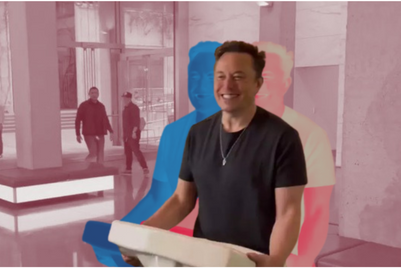
I know what you’re thinking: A Vanity Fair conference? Was this all about George Clooney, or JLaw selfies?
Well it turns out the magazine showed real restraint today in San Francisco and brought together some of the world’s best minds (and fattest wallets) to talk about how business is going to change in the years to come.
First up was Reed Hastings, CEO of Netflix (US$1 billion) and Sal Khan, founder and CEO of KhanAcademy, with an inspiring goal of mutually educating the world. Khan believes that as he reaches beyond his current 100 million viewers on YouTube, everyone on earth can move up the value chain and make the world a more peaceful place. And Asia played a big role in the company's future plans of multi-language and multi-level learning.
We switched tack to look at the business of music with MTV Founder Tom Freston and Spotify CEO Daniel Ek (US$400 million) reflecting on how the old models were broken and never to return. This year, Spotify will pay the record labels US$1 billion in license fees—a far cry from the world of Napster. In addition, the live music industry has never been more robust, as brands are connecting with musicians in fresh ways for sponsorship.
Probably the most entertaining session involved Jonah Peretti, CEO of Buzzfeed ($850 million), Shane Smith, the CEO of Vice (US$400m) and Kara Swisher of Re/Code.
Swisher slipped in the best line of the day—“You can tell the iPhone 6+ was designed and named by men, because it's only 5.5 inches”—as she showcased how large screens are feeding the video demands of consumers and the telecom networks. Within Vice, we learnt from Smith, “every spare space we have in the office, we are turning into an edit suite”. This is a global phenomenon and a huge challenge for marketers in Asia, and beyond. Without constantly fresh content, brands can become stale and lose their spontaneity. As Smith also mentioned, “Brands are taking the lead on everything we’re doing now, because at the end of the day, they are the ones with all the money”.
The room was full for Astro Teller from Google X, Max Levchen, the co-founder of PayPal and Yelp, and Gwynne Shotwell, COO of Elon Musk’s SpaceX, who talked about moonshots both literal and figurative. Astro made it clear that “at Google, we just see failure as an iterative process—something to learn from” as he peered to us through his Google Glasses, and talked about the soon to come self-driving cars. The clear message here for marketers and brands: Playing it safe is never going to break out of the box.
In the afternoon, the man himself, Elon Musk, CEO of Tesla and SpaceX (US$9.6 billion) gave us all plenty to think about, from discussing the launch of Tesla in China this year to offering up his retirement—on Mars—within the next 30 years. His was a session of inspiration, passion and ambition. “We can’t keep burning oil to move," he said. "We have to find a more sustainable solution”, also adding that “as a species , we need to build a multi-planetary existence for ourselves.” No discussion on the role of marketing on Mars.
In keeping with the ambitious theme, Eric Schmidt, CEO of Google (US$9.4 billion), Republican candidate Rand Paul and John Doerr of KPCB (US$3.3 billion) joined Washington Post Associate Editor Bob Woodward in an animated debate on the role of technology in government, education and marketing. Doerr noted that Americans spend more on potato chips than R&D into climate change, and that the US healthcare industry, at $5 trillion, would be the world’s fifth-largest country.
Michael Bloomberg (US$34 billion) and Snapchat CEO Evan Spiegel (US$1.4 billion) later continued the theme of the need for change by discussing the role of technology as an enabler. “We should hope the NSA is listening and monitoring every conversation in the US," he joked, "so this way, they would have no excuse.”
Over drinks near San Francisco harbor, we all pondered that thought, and prepared for the second day ahead.


.jpg&h=334&w=500&q=100&v=20250320&c=1)
.jpg&h=334&w=500&q=100&v=20250320&c=1)
.jpg&h=334&w=500&q=100&v=20250320&c=1)




.png&h=334&w=500&q=100&v=20250320&c=1)

.png&h=334&w=500&q=100&v=20250320&c=1)

.jpg&h=268&w=401&q=100&v=20250320&c=1)




.png&h=268&w=401&q=100&v=20250320&c=1)
